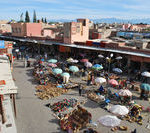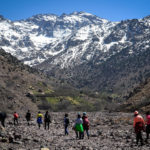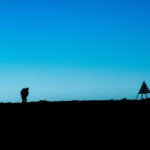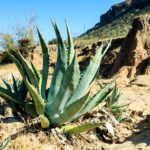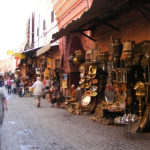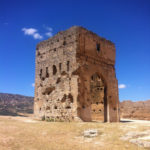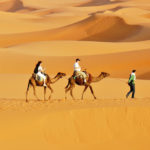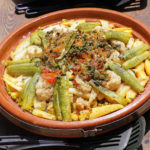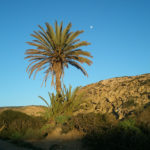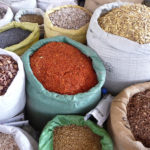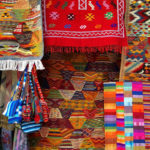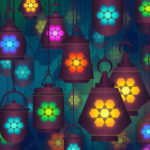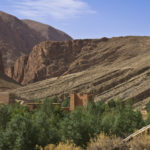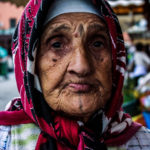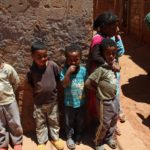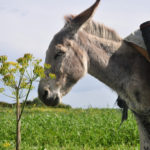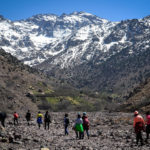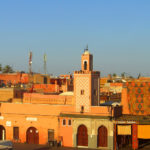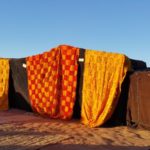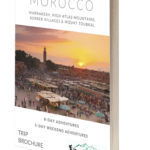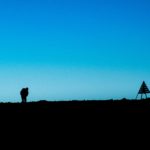Toubkal Winter Adventure Conquer North Africa's Highest Peak in Winter
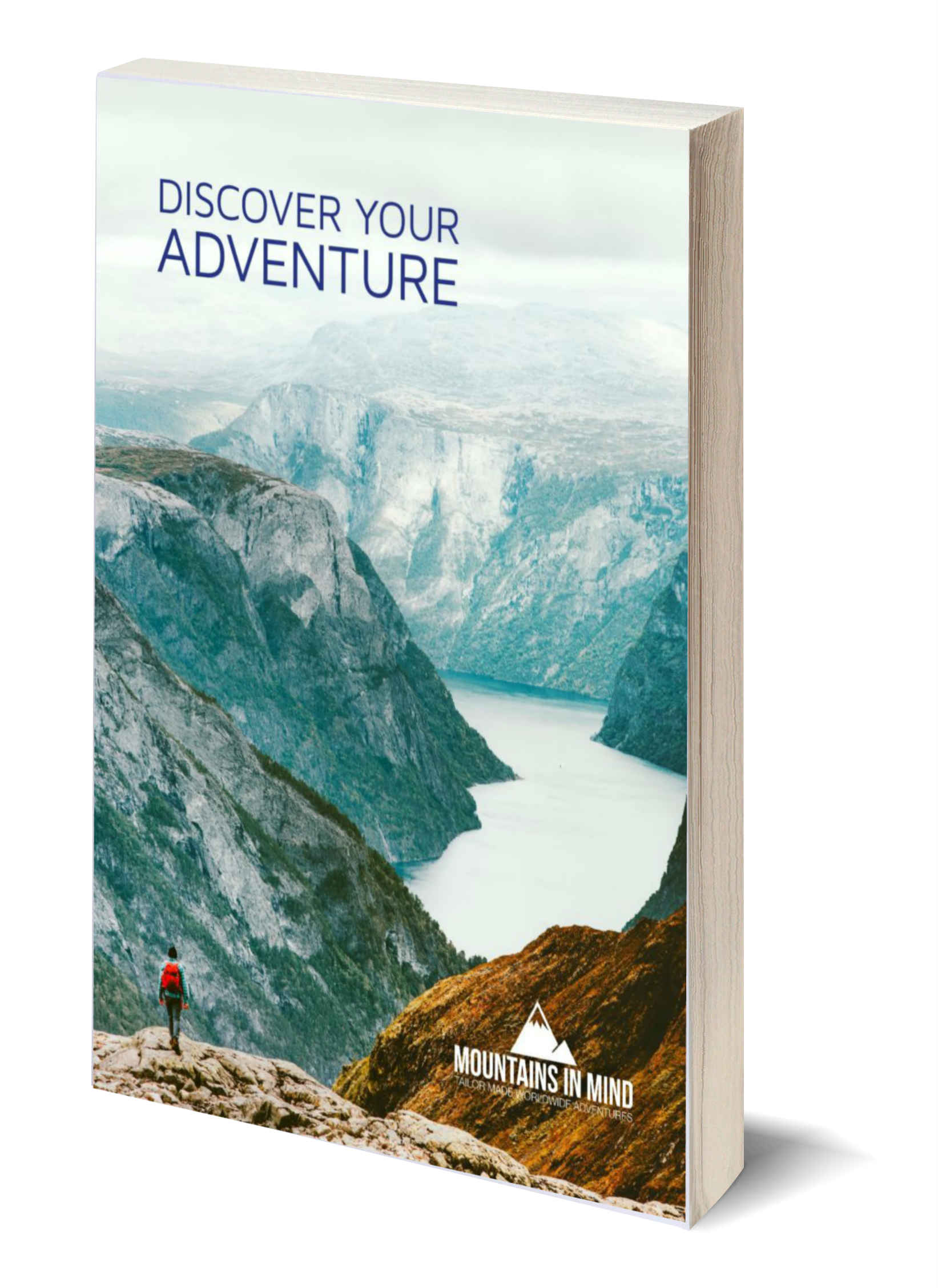

Why Choose Mountains in Mind?
- High success rate
- Excellent porter conditions
- Supporting the local community
- Small group sizes
- UK guide on all of our treks
- A tailored itinerary just for you
- Personal approach
- Selective group dates
- 1-2-1 support
- Close to the UK
- Optional additional excursions
- Fantastic scenery and a fun atmosphere
- COVID aware
- Contributes to the Triple Crown Award!
-
On this weekend trip to Morocco you’ll be able to reach the summit of Toubkal with snow under your boots. This is a tough, but rewarding weekend and you’ll only need to take two days away from work and the family. Unlike our other trips, you’ll be staying in simple Riads in Marrakech, and a typical alpine style lodge in the Atlas mountains.
The trekking in the Atlas mountains is more of a serene affair. You’ll pass through traditional Berber villages and have stunning panoramic views of the area as you climb higher. Staying overnight in the Mouflons Refuge you’ll be treated to nourishing home-cooked flavoursome meals. The trek to the summit of Toubkal is exhilarating as you reach the snow-capped ridge and are rewarded with far reaching views back towards Marrakech and across to the Sahara Desert.
-
- Thursday 16th March 2023 – Monday 20th March 2023 BOOK NOW
- Investment £625 + flights
-
- All meals during the trek.
- Basic Riad in Marrakesh
- Shared room in the Mouflon Refuge
- Fully supported local guides and muleteer team.
- Transfers to/from Marrakesh airport.
- UK expedition leader.
- Trip co-ordinator.
- Online support and advice.
- Training plan (if required).
- Memories and friends to last a lifetime!!!
-
- Flights
- Hire of Crampons and Ice Axe
- Personal insurance
- Lunch and evening meals in Marrakesh
- Beverages
- Porter tips
- Additional excursions
-
Thursday 2nd March 2022You will be greeted by our Morrocan representative and UK leader at the airport and driven to your riad in Marrakesh. Dependent upon your arrival time there may be an opportunity for sightseeing. There will be a trip briefing about the trek in the evening and the opportunity to socialise with your fellow trekkers.Friday 3rd March 2022You will be collected from your Riad in Marrakech and will be driven through the Moulay Brahim Gorges to arrive in the foothills of the Western High Atlas mountains at the trailhead at Imlil (1740m)You will be met by the Berber muleteer crew and set off towards the Refuge, passing through Berber villages and settlements. Depending on the snow base we may require to wear crampons to reach the refuge during the afternoon.Accommodation: Alpine RefugeMeals: B/L/DSaturday 4th March 2022Following breakfast, we will place on our crampons for an alpine (early) start. We aim to reach the summit of Toubkal (4167m) by late morning. After the summit celebrations, videos and selfies we carefully descend to the refuge for a late lunch before relaxing around the wood-burning stove. In the event of bad weather, there is a contingency day for the summit.Accommodation: AlpineRefugeMeals: B/L/DSunday 5th March 2022If we are unable to summit the day before we have built in a contingency day which will increase the chances of summiting.Following an early breakfast, we will place on our crampons for an alpine (early) start. We aim to reach the summit of Toubkal (4167m) by 9 am. After the summit celebrations, videos and selfies we carefully descend to the refuge for a lunch before continuing back to Imlil (1740m) and our transport back to Marrakesh.If we do not require the contingency day we depart the refuge after breakfast and descend to Imlil (1740m) and our transport back to Marrakesh.We will arrive early evening or midafternoon, which will allow time to freshen up before sampling the nightlife the city has to offer.Accommodation: RiadMeals: B/L/DMonday 6th March 2022Depending on your return flight times you may have the opportunity to walk the narrow streets of Marrakesh, collecting some souvenirs and gifts for home.Meals: BPlease note: Whilst every effort will be made to keep to the above schedule, the weather conditions, health and acclimatisation of team members could mean slight changes to the itinerary at short notice.
-
This trek is classified as challenging due to the long day trekking in winter conditions. The steepness of the paths, the possible effect of altitude and the mountainous terrain that it encounters.
To assist you in having an enjoyable experience, it helps if you have a good base level of fitness. If you have any concerns or worries over your fitness levels, we are happy to talk this through with you. We can support you with your training by discussing a training plan with you. We also offer a training weekend so that you can experience similar terrain to what you’ll experience on the trek.
-
Visit the Ksar of Ait-Ben-Haddou located in the foothills of the Atlas Mountains. The UNESCO world heritage site is the location for numerous film sets including the Mummy, Game of Thrones, Gladiator and the all-time classic, Lawrence of Arabia. The rich red clay fortified walls of the village are home to a number of kasbahs within side the Ksar. Climb to the top of the Granary for spectacular views of the surrounding area. There are several shops where you can haggle for local artisan gifts and souvenirs.
-
This is a three-day excursion to visit the Sahara desert, the world’s largest desert. You will be picked up from the hotel and travel through Berber villages to the fortified village of Ait-Ben-Haddou, a UNESCO world heritage site and the location for numerous film settings. Following lunch, the journey will continue to the Dades Gorge, where you will experience the dramatic landscapes and lush green valleys. You will spend the night here in a hotel.
Following breakfast, the excursion continues through the Todra Gorge and onto Merzouga. Here you will change the mode of transport to the camel! You’ll ride the camel across the amazing sand dunes to spend the night in a Berber Nomadic tent in the Sahara. You’ll be provided with a traditional Berber meal and be able to relax under the amazing star-filled sky. Such a mesmerising experience!
The following morning, you’ll return by camel back to Merzouga and travel back through different Berber villages to Marrakesh.
-
How fit do I need to be?
The trek climbs the highest mountain in North Africa, Jebel Toubkal at 4167m. The route isn’t technical as long as you are reasonably fit. It is best to be well prepared and to have undertaken some training back in the UK so you are familiar with moving over mountainous terrain.
You don’t need to be a marathon runner though! A general rule of thumb is if you can walk on average for 4-6 hours a day for two consecutive days back-to-back and have walked in a mountainous environment beforehand so you are familiar with walking up a hill and the terrain, you will be more than ready.What is the temperature like?
The average temperature in April in Marrakesh is 18 degrees with 8.2 hours of sunshine and 39mm of rain. In June, the average temperature is 24 degrees with 10.5 hours of sunshine and 5mm of rain.How technical is the climb?
The path to the summit requires no technical mountaineering skills but there are some steep sections along the trail and is rocky with loose scree in places. The use of crampons may be required. The descent will require sure footing and it is recommended that you use trekking poles. There may be patches of snow left from the winter so you may need to use microspikes in places.
What are the passport requirements?
British nationals will need a passport that is valid for six months from the time you enter Morroco.Do I require a visa to enter Morocco?
No visa is required.What vaccinations do I require?
We always advise you to contact a travel clinic, GP or Physician to discuss your travel plans at least four to six weeks before your departure. Details on vaccination requirements can be found at https://travelhealthpro.org.uk/country/154/moroccoPlease be aware that some of the advised vaccinations will need to be taken some weeks or months prior to your departure date to be effective.
Are there any health risks in Morocco?
We advise that you read the Travel Health Pro website for information on any health risks associated with visiting Morocco at https://travelhealthpro.org.uk/country/154/morocco#General_informationIt is advised that you do not wash, bathe, swim or wash clothes in any freshwater streams, rivers or lakes due to exposure to Schistosomiasis.
What food do I need to bring with me?
Meals are provided on the trek although it is advisable to bring some home comforts with you and your favourite snacks. Whilst trekking, it may be hot so chocolate is not recommended. Muesli bars you can eat during the day are a great idea as are packets of nuts, seeds and dried fruit.What personal kit and clothes should I bring with me?
We have compiled a very concise equipment list, which we encourage you to review. You’ll need comfortable and a worn-in pair of walking boots, a waterproof jacket and over-trousers. At first, you may think why should I need waterproofs. Although it is mainly dry, occasionally there is rain on the trek so your waterproofs will keep you dry and will also help to protect you from the wind. It will be cooler at altitude so dependent upon if you feel the cold or not, this will impact on what layers you prefer to bring.Will I have to carry all my gear on the mountain?
The simple answer is no. The muleteers will carry your luggage on the trek but you’ll be required to carry what you need during the day. A 20-25 litres rucksack will be ideal for carrying water, food, personal items, spare clothes and first aid.What size bags should I bring?
On the trek, your clothes and gear will be carried by the muleteers. For their comfort and safety, we ask that you bring a small 60-90 litre duffle style bag (NO frames/suitcases).We only hire muleteers with strict animal welfare standards. The maximum weight allowance for each donkey is 80kg.
For both your personal backpack and duffle bag it is recommended that you purchase waterproof liner bags.
What is the currency in Morocco?
The currency in Morocco is the Dirham. The Dirham is a ‘closed’ currency so you can’t technically purchase it outside Morocco. Euros and Sterling may be used in certain stores and stalls.What money should I bring?
It’s very difficult to exchange traveller’s cheques so take sterling notes with you although they must be in good condition with no pen marks or rips. Scottish banknotes are not accepted. There are ATMs available in Marrakesh to withdraw money. Credit and debit cards are widely accepted in Marrakesh but not outside in the rural areas.How much money do I take with me during the trek?
It is advisable to take some money with you for tips. We advise that you either exchange sterling for Dirhams or withdraw cash in Marrakesh prior to the trek as the Berber villages are remote and do not have any facilities.Are credit cards accepted?
Cards are widely accepted in the restaurants, cafes and local souvenir shops in Marrakesh. The markets may not take cards. Outside of Marrakesh, due to the remoteness credit or debit cards are unlikely to be accepted. It’s advisable to notify your bank before departure. There is a number of ATMs around Marrakesh where you can withdraw cash.
What is the required amount that I should tip?
In many countries around the world, tipping is part of the culture and in Morocco is standard practice. Tips in restaurants are normally in the region of 10-15% and boost the earnings of the local people. The muleteers should be tipped directly.How safe are my travel documents?
Keep your travel documents with you in your day sack on the trek. We advise that you take 2 copies with you and store electronic copies on Google drive or Dropbox.Can I leave a spare set of clothes at the hotel?
There is a facility to store the unwanted gear that you won’t need on the trek at the hotel. Although it’s advised that you take all of your valuables with you during the trek.What will I need in my first aid kit?
The most common problems adventurers experience on a trek of this kind are blisters, upset stomachs and headaches. Please review the detailed personal first aid kit in the equipment list for recommended items to carry.What if I take prescribed medication?
Please contact your doctor or a physician to confirm your medication is ok to be taken at altitude. We recommend that you pack accordingly for the number of days you are in Morocco. Carry your personal medication in your hand luggage and bring an additional quantity just in case you lose it. If you have any medical conditions, please notify us on the booking form and again on arrival in Morocco. If your conditions change, please contact us before departure.Will I get altitude sickness?
Altitude sickness is a possibility but is rare when climbing Jebel Toubkal as you will descend back down to the Mouflons Refuge after you have reached the summit. You will be trekking through valleys and the foothills of the High Atlas at a steady pace to acclimatise and will spend a night at the Mouflons Refuge at 3200m before heading to the summit.You may experience mild symptoms of altitude sickness, such as breathlessness, a headache or nausea. Severe altitude sickness is extremely rare.
Can I take Diamox?
The use of Diamox (Acetazolamide) has always been a topic of much discussion. The drug was designed for the treatment of a number of conditions; glaucoma, sleep apnea, epileptic seizures, to name but a few. It was never designed for helping with the acclimatisation process. That being said, there are many reported accounts of the drug aiding with acclimatisation and it can now be prescribed from your GP or Physician.There is a proven method of administration and we can discuss this with you on arrival in Morocco. All we ask is you let us know you are intending to self-medicate as this will help with the mountain medical care.
Is the water safe to drink?
You should always drink bottled water in Marrakesh and on the trek. On the trek, do not drink from streams unless you use a water filtration system, purification tablets or a portable water purification device like the Lifestraw. Waterborne parasites, including giardia, are found in the streams. You can buy bottled water from the villages and refuge.Is there any food that I should avoid?
Many people visiting Morocco do experience stomach issues so you need to be careful about where you purchase any food from and what types of food you eat. Do not eat salad and only eat fruit that you have washed in bottled water and peeled yourself. Avoid ice in drinks.Ensure you wash your hands or use hand-sanitiser prior to eating as it is very dusty. Traditionally, meals are often shared communally.
There are many street stalls that sell food in Marrakesh. Ensure there are no flies on food, that it’s freshly prepared and piping hot before purchasing. A general rule of thumb is to look for where the locals eat.
Can I drink alcohol?
Morocco is a Muslim country but restaurants are permitted to sell alcohol to foreign tourists. There are some Moroccan beer and wines that can be purchased. You are unlikely to find alcohol in rural areas.What toiletries should I bring on the trek?
The most common illness on any expedition overseas (and the UK) is sickness and diarrhoea. This you may think is from the drinking the water or food but in reality is usually from poor personal hygiene (dirty hands/fingernails). We suggest bringing a small nail brush, baby wipes, sanitising gel, toilet paper and any other basic products with you on the trek as these are not readily available.Are transfers from Marrakesh airport included in the trip and how long will the transfer take?
You will be met at Marrakesh airport by a representative from Mountains in Mind, who will be holding a board with the company’s logo. You will then be taken straight to the hotel. The journey time is approximately 15 minutes or so.What power adapters should I bring?
In Morocco, the power supply is 220v. You will need a standard European two-pin travel adaptor. -




